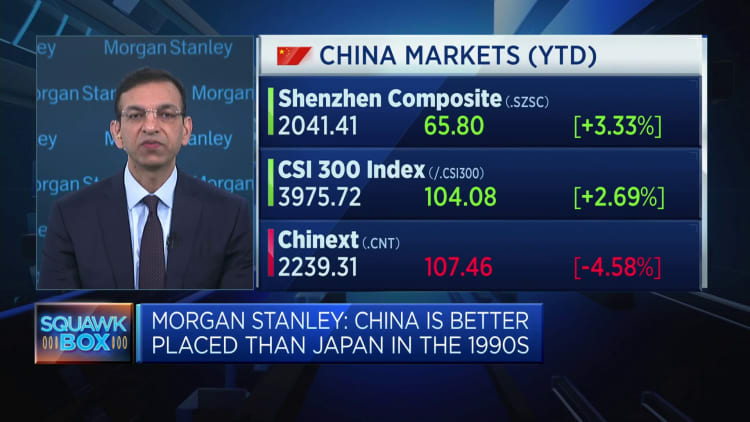A woman walks at the Bund in front of the financial district of Pudong in Shanghai, China.
Aly Song | Reuters
China’s economy is facing a growing number of challenges.
The latest credit data for July reveal a decrease in demand from businesses and households for borrowing money. The real estate sector is also struggling, with developer Country Garden on the verge of default. Additionally, consumer sentiment is weak.
“The weak July credit data suggest that the decline in the property sector continues, and worsening geopolitical tensions contribute to the uncertainty,” said Lu Ting, chief China economist at Nomura, in a report on Friday.
“In Japan during the 1990s, companies may have paid down their debt to improve their chances of survival, but in today’s China, both companies and households are reducing their borrowing due to a lack of confidence and trust,” the report added.
All the factors just cannot mask how weak credit demand is and how low risk appetite is.
Xiangrong Yu
Chief China Economist, Citi
New local currency bank loans in July plummeted by 89% compared to June, totaling 345.9 billion yuan ($47.64 billion). This figure is less than half of what analysts had predicted in a Reuters poll.
According to Reuters, the July new yuan loan number is the lowest since late 2009.
“These numbers should represent a low point, considering the policy moves in June may have influenced some demand,” noted Xiangrong Yu, chief China economist at Citi, in a note.

“Yet all the factors just cannot mask how weak credit demand is and how low risk appetite is,” the analysts said. They expect rate cuts by the end of September to mitigate the risk of China missing its growth target of around 5% for this year.
On Tuesday, China is set to release July economic data that is expected to show no change in the pace of growth for industrial production and fixed asset investment compared to June, according to a Reuters poll. Retail sales are expected to rise by 4.7% year-on-year in July, slightly faster than in June.
Real estate drag
China’s massive real estate sector, where most household wealth is invested, has become a cause for concern in terms of its potential to drag down the overall economy.
Developer Country Garden recently announced the suspension of trading in at least 10 of its yuan-denominated bonds in mainland China. The company also missed coupon payments on two U.S. dollar-denominated bonds last week.
According to Goldman Sachs analysis, Country Garden’s U.S. dollar bonds make up nearly a majority of outstanding high-yield bonds, while investment-grade China U.S. dollar bonds account for 43% of the total.
“While the majority of high-yield developers have either defaulted or undergone bond exchanges, our concern lies in whether such stresses will spread to investment-grade developers, most of which are state-owned enterprises,” stated the Goldman analysts in a report on Friday.
The more the government tries to help the real estate industry, the longer it takes for the industry to find a reasonable bottom.
Louis Lau
Brandes Investment Partners
In China, state-owned companies have had an easier time obtaining loans, especially since state-owned banks dominate the market. State-owned developers have also experienced better sales compared to non-state-owned developers.
However, the entire real estate sector in China still needs to contract by about 10 percentage points to reach a similar level of GDP contribution as Japan or South Korea, as stated by Louis Lau, director of investments and emerging markets portfolio manager at Brandes Investment Partners. He noted that while real estate contributes about 30% to China’s GDP, it constitutes only around 20% in South Korea and Japan.
In 2020, the Chinese government began cracking down on the high debt reliance of developers for growth. While authorities have recently eased their stance, there has not been large-scale stimulus.
“The more the government tries to support the real estate industry, the longer it will take for the industry to stabilize,” said Lau. He has a cautious approach towards China and focuses on selective investments in consumer names and industries expected to outperform.
Denial of responsibility! VigourTimes is an automatic aggregator of Global media. In each content, the hyperlink to the primary source is specified. All trademarks belong to their rightful owners, and all materials to their authors. For any complaint, please reach us at – [email protected]. We will take necessary action within 24 hours.


